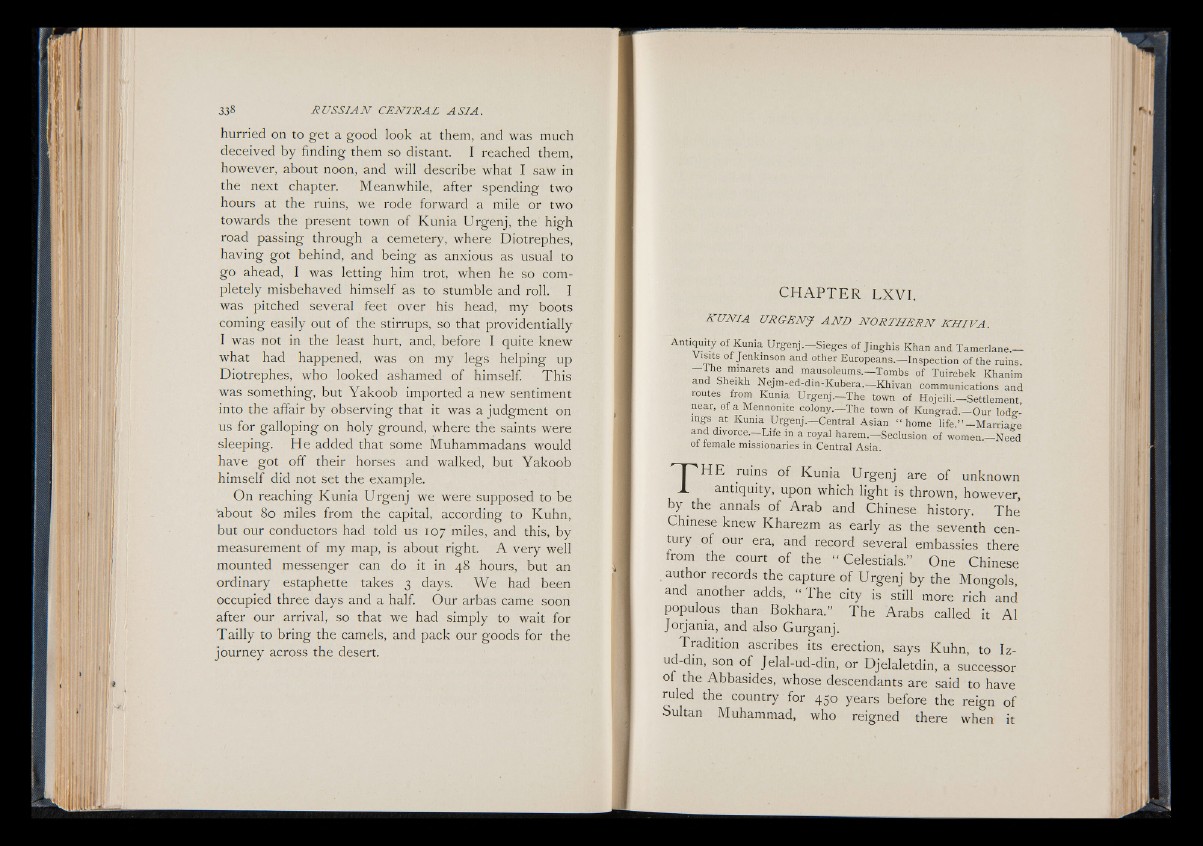
hurried on to get a good look at them, and was much
deceived by finding them so distant. I reached them,
however, about noon, and will describe what I saw in
the next chapter. Meanwhile, after spending two
hours at the ruins, we rode forward a mile or two
towards the present town of Kunia Urgenj, the high
road passing through a cemetery, where Diotrephes,
having got behind, and being as anxious as usual to
go ahead, I was letting him trot, when he so completely
misbehaved himself as to stumble and roll. I
was pitched several feet over his head, my boots
coming easily out of the stirrups, so that providentially
I was not in the least hurt, and, before I quite knew
what had happened, was on my legs helping up
Diotrephes, who looked ashamed of himself. This
was something, but Yakoob imported a new sentiment
into the affair by observing that it was a judgment on
us for galloping on holy ground, where the saints were
sleeping. He added that some Muhammadans would
have got off their horses and walked, but Yakoob
himself did not set the example.
On reaching Kunia Urgenj we were supposed to be
about 80 miles from the capital, according to Kuhn,
but our conductors had told us 107 miles, and this, by
measurement of my map, is about right. A very well
mounted messenger can do it in 48 hours, but an
ordinary estaphette takes 3 days. We had been
occupied three days and a half. Our arbas came soon
after our arrival, so that we had simply to wait for
Tailly to bring the camels, and pack our goods for the
journey across the desert.
C H A P T E R L X V I .
K U N IA U R G EN J A N D N O R TH E R N K H IV A .
Antiquity of Kunia Urgenj.—Sieges of Jinghis Khan and Tamerlane.—
Visits of Jenkmson and other Europeans.— Inspection of the ruins,
— the minarets and mausoleums.— Tombs of Tuirebek Khanim
and Sheikh Nejm-ed-din-Kubera.— Khivan communications and
routes from Kunia Urgenj.—The town of Hojeili.— Settlement,
near, of a Mennonite colony.—The town of Kungrad.— Our lodgings
at Kunia Urgenj.— Central Asian “ home life.” —Marriage
and divorce.— Life in a royal harem.— Seclusion of women.—Need
of female missionaries in Central Asia.
[ ruills ° f Kunia Urgenj are of unknown
-L antiquity, upon which light is thrown, however,
by the annals of Arab and Chinese, history. The
Chinese knew Kharezm as early as the seventh century
of our era, and record several embassies there
from the court of the “ Celestials.” One Chinese
. author records the capture of Urgenj by the Mongols,
and another adds, “ The city is still more rich and
populous than Bokhara.” The Arabs called it A 1
Jorjania, and also Gurganj.
Tradition ascribes its erection, says Kuhn, to Iz-
ud-din, son of Jelal-ud-din, or Djelaletdin, a successor
of the Abbasides, whose descendants are said to have
ruled the country for 450 years before the reign of
Sultan Muhammad, who reigned there when it